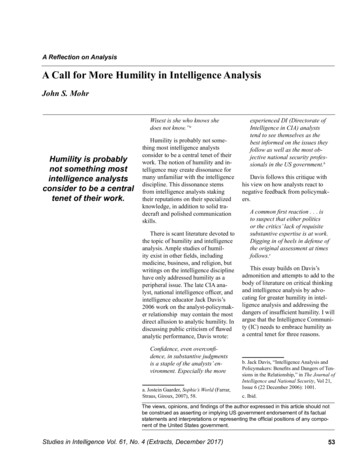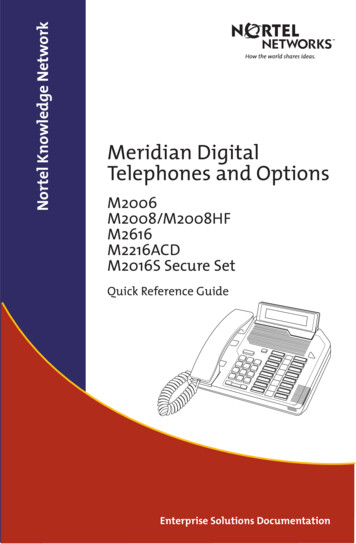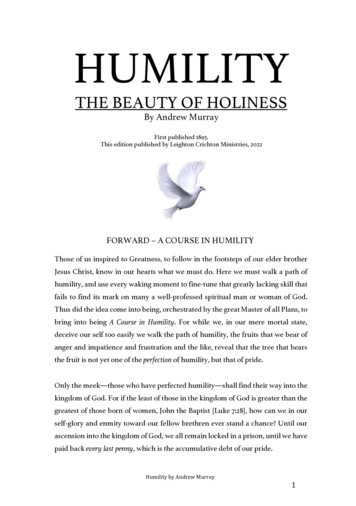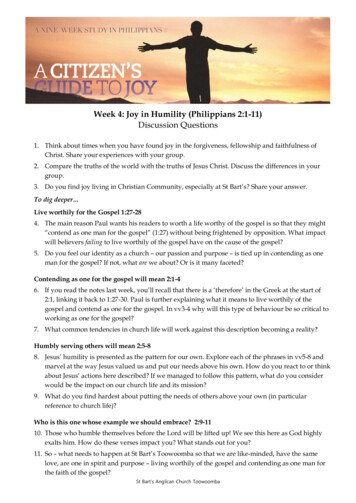
Transcription
A Reflection on AnalysisA Call for More Humility in Intelligence AnalysisJohn S. MohrWisest is she who knows shedoes not know.”aHumility is probablynot something mostintelligence analystsconsider to be a centraltenet of their work.Humility is probably not something most intelligence analystsconsider to be a central tenet of theirwork. The notion of humility and intelligence may create dissonance formany unfamiliar with the intelligencediscipline. This dissonance stemsfrom intelligence analysts stakingtheir reputations on their specializedknowledge, in addition to solid tradecraft and polished communicationskills.There is scant literature devoted tothe topic of humility and intelligenceanalysis. Ample studies of humility exist in other fields, includingmedicine, business, and religion, butwritings on the intelligence disciplinehave only addressed humility as aperipheral issue. The late CIA analyst, national intelligence officer, andintelligence educator Jack Davis’s2006 work on the analyst-policymaker relationship may contain the mostdirect allusion to analytic humility. Indiscussing public criticism of flawedanalytic performance, Davis wrote:Confidence, even overconfidence, in substantive judgmentsis a staple of the analysts’ environment. Especially the morea. Jostein Gaarder, Sophie’s World (Farrar,Straus, Giroux, 2007), 58.experienced DI (Directorate ofIntelligence in CIA) analyststend to see themselves as thebest informed on the issues theyfollow as well as the most objective national security professionals in the US government.bDavis follows this critique withhis view on how analysts react tonegative feedback from policymakers.A common first reaction . . . isto suspect that either politicsor the critics’ lack of requisitesubstantive expertise is at work.Digging in of heels in defense ofthe original assessment at timesfollows.cThis essay builds on Davis’sadmonition and attempts to add to thebody of literature on critical thinkingand intelligence analysis by advocating for greater humility in intelligence analysis and addressing thedangers of insufficient humility. I willargue that the Intelligence Community (IC) needs to embrace humility asa central tenet for three reasons.b. Jack Davis, “Intelligence Analysis andPolicymakers: Benefits and Dangers of Tensions in the Relationship,” in The Journal ofIntelligence and National Security, Vol 21,Issue 6 (22 December 2006): 1001.c. Ibid.The views, opinions, and findings of the author expressed in this article should notbe construed as asserting or implying US government endorsement of its factualstatements and interpretations or representing the official positions of any component of the United States government.
A Reflection on AnalysisUncertainty is among the few certainties in the intelligence field and requires humility to appreciate. First, humility helps the community cope with uncertainty that isinherent to the industry. Second, a humble perspective reveals that genuine subject matterexpertise is rare. Finally, a lack of humility canmanifest itself as hubris and causeharm to analysis.While I am writing from anintelligence analyst’s perspective,the facets of humility I discuss applyacross functions in the IC.Scholars of critical thinking Dr.Richard Paul and Dr. Linda Elderinclude intellectual humility as one ofeight intellectual traits in their seminal work on critical thinking. Theydefine intellectual humility ashaving a consciousness of thelimits of one’s knowledge, including a sensitivity to circumstances in which one’s nativeegocentrism is likely to functionself deceptively; sensitivity tobias, prejudice and limitationsof one’s viewpoint. Intellectualhumility depends on recognizing that one should not claimmore than one actually knows.It does not imply spinelessnessor submissiveness. It implies thelack of intellectual pretentiousness, boastfulness, or conceit,combined with insight into thelogical foundations, or lackof such foundations, of one’sbeliefs.aa. Richard Paul and Linda Elder, CriticalThinking: Tools for Taking Charge of YourProfessional and Personal Life (PearsonEducation, Inc., 2002), 22. Intelligence analysts are unlikelyto protest the utility or applicabilityto intelligence analysis in what thesescholars postulate. To what extent,however, do IC analysts heed theirwords? I believe there are three majorreasons they should.Reason 1: Humility HelpsUs Cope with UncertaintyUncertainty is among the fewcertainties in the intelligence fieldand requires humility to appreciate.Uncertainty underpins humility, according to Paul and Eider’s view thathumility entails comprehending thelimits of one’s knowledge. While theIC strives to combat uncertainty bypursuing new collection and methodsto fill gaps and goes to great lengthsto convey degrees of uncertainty toclients, it remains an uncomfortableand persistent constant.One of the first lessons I learnedas a student at the US Air Forceintelligence officer school was to becomfortable saying to a questioner, “Idon’t know, but I’ll get back to you.”Author and scholar Leah Cohen devotes an entire book to this theme. InI Don’t Know she argues that embracing this theme improves communication and enables more honest debatesabout issues.b This simple conceptof admitting ignorance is hard toimplement, particularly when one’sreputation is tied to knowledge of aparticular topic.b. Leah Hager Cohen, I Don’t Know: InPraise of Admitting Ignorance (ExceptWhen You Shouldn’t) (Riverhead Books,2013)Washington Post staff writer JoelAchenbach alludes to this awkwardacceptance of uncertainty in his2007 article on the absence of doubtamong Washington policymakers.While he does not make referenceto the IC, Achenbach’s findings aredirectly applicable to intelligenceanalysis. He writes,Doubt has been all but outlawedin contemporary Washington.Doubt is viewed as a weakness.You are expected to hold ontoyour beliefs even in a hurricaneof contradictory data. Believingin something that’s not true isconsidered a sign of character.cIn other words, he is encouragingreaders to embrace uncertainty andopen their minds to new evidenceas it surfaces. Achenbach goes onto discuss the dissonance betweenasking questions and a culture thatdemands instant answers: “Definingyour problem correctly, examiningevidence and contemplating biasescan be extremely inconvenient.”dThese steps should be staples in intelligence analysis.Intelligence analysts should striveto employ humility to cope with theirlack of knowledge and fallibility, asa means to improve thinking. Pauland Elder argue that an awareness ofone’s ignorance can improve thinkingby illuminating “prejudices, falsebeliefs, or habits of mind that leadto flawed learning.”e This idea iscentral to intelligence analysis, whichintelligence community veteran Dr.c. Joel Achenbach, “Three Cheers for Nervous Hand-Wringing,” Washington Post,1 July 2007.d. Ibid.e. Paul and Elder, Critical Thinking, 23.Studies in Intelligence Vol. 61, No. 4 (Extracts, December 2017)
A Reflection on AnalysisMark Lowenthal describes as an“intellectual process prone to all sortsof challenges.”aFormer Office of the Director ofNational Intelligence staff memberElbridge Colby discusses the complex and often politically-chargedsubstantive challenges the IC facesin a posting on the website of theHoover Institution. According toColby,These are questions of intentionand of human decisions. Theyare not questions that can beanswered satisfactorily by beingrun through a computer. Theyrequire a depth of knowledge,a humility about our ability tounderstand and predict, and aholy fear of the power of contingency.bIn their 2015 book, Superforecasting, Phillip Tetlock and DanGardner argued that humility is a keytrait for “superforecasters,” a termcoined to describe people who excelin accurately predicting events. This“spirit of humility” recognizes “asense that the complexity of reality isstaggering, our ability to comprehendlimited, and mistakes inevitable.”ca. Mark Lowenthal and Ronald Marks,“Intelligence Analysis: Is It As Good As ItGets?” International Journal of Intelligenceand Counterintelligence, Vol. 28, Issue 4:(5 August 2015): 664.b. Elbridge Colby “Making IntelligenceSmart,” Hoover Institute, Aug-Sept martc. Phillip Tetlock and Dan Gardner, Superforecasting: The Art and Science of Prediction (Crown Publishing Group, 2015), 3and 212–13.Examining how the IC defines this nebulous concept ofexpertise and at what point it extends into hubris is germane to understanding humility.Reason 2: Humility Reveals Subject MatterExperts are RareDeveloping expertise is amongthe IC’s primary tools to fight uncertainty, but true expertise is rare andtakes considerable time and effort todevelop. Showcasing expertise oftenmanifests in using the ubiquitous andoverused title known as “SME” orsubject matter expert. It is not clearif this title is self imposed or earned,or if its use is for self-promotion orto boost an agency’s credentials. Itsuse is a swift way for an analyst toestablish their credibility, whether inan e-mail or during an introductionfor a briefing. The term’s overuse,however, risks diluting its value andoverplaying the IC’s hand in whatit can actually provide to clients,therefore violating Paul and Eider’sposition that one should not claimmore than one actually knows.No analyst would want to be introduced as a novice on North Korea,and no manager would want to turnaway a tasking because the officelacks expertise, but the IC needs toguard against applying the SME titletoo broadly and consider what reallyconstitutes an expert.Examining how the IC defines thisnebulous concept of expertise and atwhat point it extends into hubris isgermane to understanding humility.dMost analysts have advanced educational degrees, may have visited thed. For a textbook discussion on expertise inintelligence analysis, see Mark Lowenthal,Intelligence: From Secrets to Policy (CQPress, 2016), 163–216.Studies in Intelligence Vol. 61, No. 4 (Extracts, December 2017)countries in their portfolios, and havestudied their targets’ major facets,from political institutions to securityactors. Some have foreign languagecapabilities, which may amplifyunderstanding of cultural nuances.An academic would be quick to pointout that this substantive depth, likeunderstanding the difference betweenthe Tuareg and the Toubou, is notunique to the IC. As in academia, theprocess aspects of our work—usinglogic, reasoning, and evidence—areas important as substance. Tetlockand Gardner argue that how forecasters think is paramount and that superforecasters tend to be open-minded,careful, curious, and self-critical.eCIA veteran and author of a seminal often-cited work, Psychology ofIntelligence Analysis, Richards Heueradds to this by saying, “analystsshould think about how they makejudgments and reach conclusions, notjust about the judgments and conclusions themselves.”fTime spent on a subject has alsobeen used to define expertise, suggesting that after some arbitrary period an analyst becomes a substantiveexpert. In his book, Lowenthal positsa period of around 5 years for an analyst to be considered a subject matterexpert.g Bestselling author MalcolmGladwell takes a similar approachin his book, Outliers. He offers a“10,000-hour rule,” which says thate. Tetlock and Gardner, 20.f. Richards Heuer, Psychology of Intelligence Analysis, (Center for the Study ofIntelligence, 1999), 31.g. Lowenthal, Intelligence: From Secrets toPolicy, 210–11.
A Reflection on AnalysisThe antithesis of intellectual humility is intellectual hubris, a quality that may be most harmful in the intelligencefield because of the impact on analysis.it takes 10,000 hours of deliberatepractice to be considered “worldclass” in a subject.a While his rulerefers to performance that transcendsthe expert level and into the elitelevel, it supports the argument thatanalysts should work a portfolio fora longer time period to develop depthand continuity, instead of movingevery few years. This is not to say,however, that analysts should become“hedgehogs”—the term Tetlock usesto describe those who know one bigthing well—rather than “foxes”—Tetlock’s term for nimbler thinkers.bTetlock’s research suggests that foxesare superior forecasters.cIn my 13 years in the IC, I canthink of a handful of analysts I wouldconsider true experts. The most prominent is one who shared the commonanalyst’s experience by studying thetarget country at a university, traveling there, and working the portfoliofor more than a decade, signalinga commitment to a focus area. Hecould recite all of the country’s majorfacets—the size of its army, headsof state tenures, geographic features,and economic imperatives. Thisanalyst’s knowledge, however, wentmuch deeper.a. Malcolm Gladwell, Outliers: The Story ofSuccess (Little, Brown & Company, 2011),35–40.b. Philosopher Isiah Berlin, drawing on anancient Greek poem, originally developedthe fox and hedgehog framework, whichTetlock incorporated into his work. (Superforecasting, 69.)c. Tetlock and Gardner, Superforecasting, 69.How did the analyst cross into theexpert threshold? The analyst’s housewas filled with nearly every bookwritten on his target country, he hadregular dialogue with leading academics who had done field researchin his country, and he had colleagueswho were natives of the country orstill lived there. He also traveledregularly to the country, often for extended periods, and journeyed outsideof the capital where he could meetvarious stakeholders, including nongovernmental organizations, religiousofficials, and citizens outside of elitecircles. He understood how elites inhis target country thought and hisexpertise was in high demand frompolicymakers.True expertise alone does notprevent intellectual hubris and cansometimes foster it. Tetlock, in one ofhis research’s main points, says thatspecialists in a field are often not significantly more reliable than non-specialists in forecasting what is goingto happen in their region of study.dHis work is a reminder of the valueof self reflection for anyone workingin a field like intelligence analysis,no matter what their experience orexpertise.Dr. Kjetil Hatlebrekke and Dr.M. L. R. Smith, in their 2010 articleexamining the human and cognitiveunderpinnings of intelligence shortfalls, allude to the dangers of notpracticing self-awareness. They advocate for “the importance of humilityand responsibility in relation to threatd. Phillip Tetlock, Expert Political Judgement, How Good is It, How Can We Know?(Princeton University press, 2005), 42–43.perception and what the results maybe if such humility and self-criticismare not taken seriously.”e(U) Reason 3: Lack of Humility Can Harm AnalysisThe antithesis of intellectual humility is intellectual hubris, a qualitythat may be most harmful in the intelligence field because of the impact onanalysis. Analysts are often passionate about their work and employ whatis usually a healthy defense to anychanges to it. The pressures analystsface to answer salvos of policymakerdemands may contribute to arroganceamong analysts. Sometimes, however, analysts become entrenched intheir views and become unwilling tohear alternative views.This mentality is commonlymanifest in coordination or peerreview processes in which analystsreceive feedback on articles they havewritten from colleagues who maytake different views. Many analystsinstinctively prepare for the defensiveby crafting counterpoints, which riskdevolution into verbal or e-mail sparring. It is during these moments thatPaul and Eider’s guidance to examinethe logical foundations of our beliefsis particularly relevant. I once heardthat coordination is “free feedback,”which is a mindset that helps advancecollaboration, no matter how challenging the coordination. Psychologist Adam Grant’s “givers and takers”framework encourages us to mirrorthis philosophy when providinge. Kjetil Hatlebrekke and M. L. R. Smith,“Towards a New Theory of IntelligenceFailure? The Impact of Cognitive Closureand Discourse Failure,” Journal of Intelligence and National Security, Vol 25, No. 2(5 July 2010): 147.
A Reflection on Analysisfeedback to a colleague. In discussinggivers, Grant says “a willingness tohelp others achieve their goals is atthe heart of effective collaboration,innovation, quality improvement, andservice excellence.”aIntellectual hubris impedes collaboration in the process of sincerelyaddressing dissent. Paul and Elder’sdefinition of intellectual humilityincludes awareness of the deceptiveness of one’s native egocentrism.This egocentrism is what Tetlock says“prevents us from seeing any worldbeyond the one visible from the tipsof our noses.”bAn analyst’s ego is also anautomatic defense against a dissentbecause of the stigma associated withit. Few analysts welcome disagreement with their theses and insertionof dissent into their work. Striving toalter this mindset into one that seesa dissent as a means to strengthenanalysis would enrich such analysis.Dissent also underscores the complexity of the issues the IC faces, theuncertainty ingrained in them, andpresents policymakers with additionalperspectives.Another important facet in evaluating humility is how we respondto criticism or to instances where weare wrong. There are scores of pagesdevoted to the study of intelligencefailures, which focus on system-leveldeficits. Lowenthal and former CIAofficer Ronald Marks advocate for a“robust ‘lessons learned’ capability”a. Adam Grant, “In the Company of Giversand Takers,” Harvard Business Review,April 2013 at d-takers.b. Tetlock and Gardner, Superforecasting, 233.Another important facet in evaluating humility is how werespond to criticism or to instances where we are wrong.to reflect on such analytic lapses.cThis same mentality is importantat the individual level too. How doanalysts reconcile their own shortfalls, whether missing an assessment or facing disagreement from apolicymaker during a briefing? Amidthe steady production grind, it isimportant to pause to admit one waswrong and reflect on the respectivecauses that Tetlock and Gardner callan “unflinching postmortem.”d Thismay entail revisiting one’s evidenceand critiquing one’s own assessment.It could also involve outreach to akey stakeholder who may have had adivergent view that has since becomemore pertinent. Tetlock and Gardner also suggest that people facingsituations with great uncertainty keepa journal to “create an immutable record” that they can reference.e Theseare tough steps to take, particularlywhen one is on the losing side.Proposals to Cultivate HumilityHow then can the IC encourageand institutionalize humility, andhow can it keep people humble? Thefollowing recommendations seek toachieve these goals: A Recertification process. Anintelligence analysis aptitudeassessment, akin to a physician’sc. Mark Lowenthal and Ronald Marks,“Intelligence Analysis: Is It As Good As ItGets?”: 664.d. Tetlock and Gardner, Superforecasting, 283e. Dan Gardner and Philip Tetlock,“Anxious about the election? Here’s someperspective,” Washington Post, 4 November2016requirement to pass a board certification exam every 10 years, wouldwork toward institutionalizinghumility. The project managementprofessional’s certification processoffers a gold standard model andthe Defense Department’s “Certified DoD All-Source Analysis”program is a step toward this, inthe way it requires DoD analyststo pass a comprehensive knowledge exam.f Continuing education. The IC Advanced Analyst Program (ICAAP)provides a standard of continuingeducation for analysts. The ICshould seek more informal waysto promote continuing educationthrough avenues such as periodic“coffee” or “lunch” talks in whichanalysts give presentations ontheir current research. Double down on analytic outreach. Analytic outreach is amongthe fastest ways to overcome thelimits of our knowledge. The StateDepartment’s Intelligence andResearch Bureau’s outreach eventsserve as a community model.Individual analysts should seekto develop their own outreachnetworks through the appropriateanalytic outreach avenues. A new ODNI analytic standard.The analytic standards and associated tradecraft standards embodyaspects of humility but do notexplicitly address them. Incorporating intellectual humility as ananalytic standard would be amongf. Catherine Johnston et al., “TransformingDefense Analysis,” Joint Forces Quarterly,Issue 79 (Fourth Quarter 2015): 16.
A Reflection on AnalysisAt its core, intelligence analysis is an intellectual—notmechanical—activity.the strongest means to apply theprinciple. Embrace a customer servicementality. Remembering ourraison d’etre and that we supportthe greater good is imperative topromoting humility as a community. We exist, not for self-promotion, but to support policymakingclients. Utilize humor. Humor is the sisterof humility, and self-deprecatinghumor can go a long way towardpromoting humility. Personal ownership. No formal program is a substitute forindividual efforts to incorporatehumility into analysis and devotetime to personal reflection. Humility is a private quality and carriesdifferent meaning to differentpeople.Intelligence analysis pioneerSherman Kent famously said thatif given three wishes, intelligenceprofessionals would desire to knoweverything, to be believed, and to influence policy for the good.a Imbuedin this, however, is intellectual humility and recognition of the limits ofour knowledge and openness to otherviewpoints.At its core, intelligence analysisis an intellectual—not mechanical—activity, as Lowenthal has adeptlydescribed.b This activity is nestedin a business dominated by uncertainty, a paradigm we must acceptwhile constantly pushing for new anda. Sherman Kent, “Estimates and Influence”in Sherman Kent and the Board of NationalEstimates—Collected Essays (Originallyin Studies in Intelligence, Summer 1968)at essays/4estimates.htmlb. Mark Lowenthal, “A Disputation onIntelligence Reform and Analysis: My18 Theses,” International Journal of Intelligence and Counterintelligence, Vol. 26Issue 1 (30 November 2012), 32.vvdeeper knowledge. Intelligence focusareas are intrinsically complex andthe community needs to understandthe limits of its knowledge so as tonot overplay its hand. Doing so willreflect more accurately the servicesthe community provides to clients,such as providing niche value.We also must constantly guardagainst hubris and, in our most confident moments, recall the early daysof our careers, when we sometimesseemed overwhelmed by the scopeof a new portfolio or the magnitudeof our work. All passionate analystsbecome the chief advocates anddefenders of their work, owing tothe intimate study of a topic and theslog of written production. While thismentality fuels our work, we needto pause to remind ourselves that wework in a service industry in whicha service philosophy will advancehumility. Ensuring humility is ingrained in all aspects of intelligenceanalysis will help uphold the intelligence community’s longstanding,quiet professionals, credo, instilled inPresident Kennedy’s words that our“successes are unheralded.”vThe author: John S. Mohr is a DIA analyst who currently works in the NORAD and USNORTHCOM J2. He has servedin DIA in Washington and as a country director on the National Security Council Staff.
forecasting: The Art and Science of Pre-diction (Crown Publishing Group, 2015), 3 and 212-13. Reason 2: Humility Re-veals Subject Matter Experts are Rare Developing expertise is among the IC's primary tools to fight uncer-tainty, but true expertise is rare and takes considerable time and effort to develop. Showcasing expertise often










